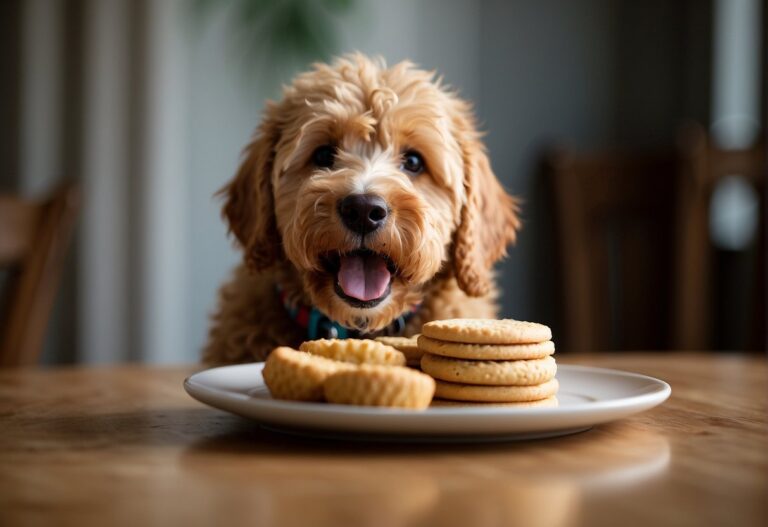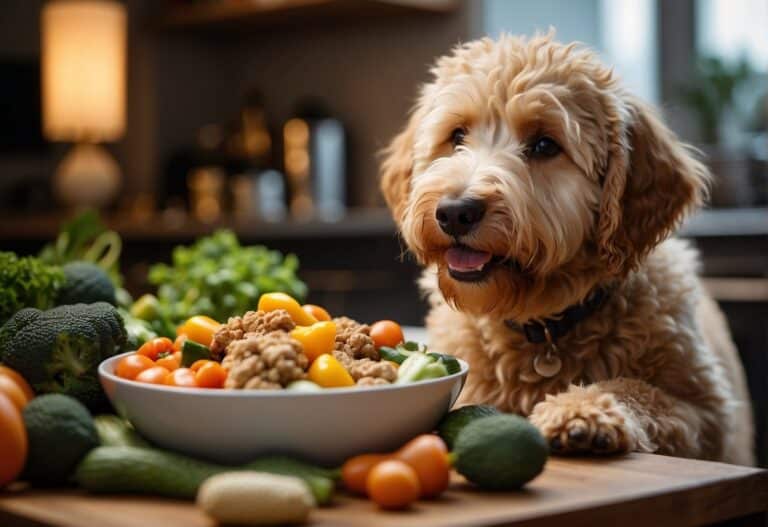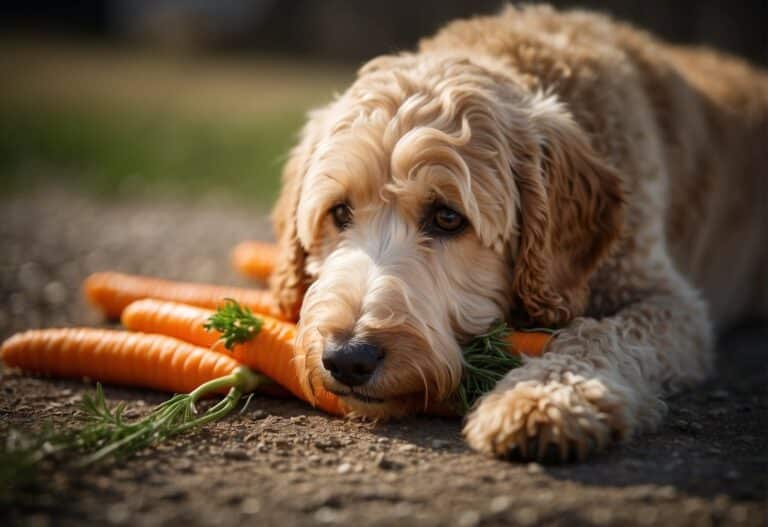Can I Feed My Miniature Goldendoodle Grains? Expert Advice

If you’re a proud owner of a Miniature Goldendoodle, you know that feeding your furry friend a balanced diet is crucial for their overall health and well-being. One question that may come up is whether you can feed your Miniature Goldendoodle grains. The answer is yes, but it’s important to understand your dog’s dietary needs and choose the right type of grains.
Dietary Needs for Your Miniature Goldendoodle
Like all dogs, Miniature Goldendoodles require a balanced diet that includes protein, carbohydrates, fats, vitamins, and minerals. Grains can provide a source of carbohydrates, which are essential for energy. However, it’s important to choose the right type of grains and feed them in moderation.
Essential Nutrients for a Balanced Diet
When choosing grains for your Miniature Goldendoodle, look for those that are high in fiber and contain essential nutrients like B vitamins, iron, and zinc. Good options include brown rice, quinoa, and oats. However, remember that grains should not make up the majority of your dog’s diet. A balanced diet should also include high-quality protein from sources like chicken, beef, and fish, as well as healthy fats and a variety of fruits and vegetables.
- Feeding your Miniature Goldendoodle a balanced diet is crucial for their overall health and well-being.
- Grains can be a source of carbohydrates, but it’s important to choose the right type and feed them in moderation.
- A balanced diet should include high-quality protein, healthy fats, and a variety of fruits and vegetables in addition to grains.
Dietary Needs for Your Miniature Goldendoodle

Feeding your Miniature Goldendoodle a well-balanced diet is essential for their overall health and well-being. When it comes to their dietary needs, there are several factors to consider, including their size, weight, energy levels, growth and development stages, and common health considerations.
Size, Weight, and Energy Levels
Miniature Goldendoodles are small to medium-sized dogs, typically weighing between 15 to 35 pounds. Their energy levels can vary depending on their age, size, and activity level. As a general rule of thumb, puppies require more calories than adult dogs, and active dogs require more calories than sedentary ones.
Growth and Development Stages
During the growth and development stages, puppies require a diet that is high in protein and fat to support their rapid growth and development. As they mature, their nutritional needs change, and their diet should be adjusted accordingly.
Common Health Considerations
Miniature Goldendoodles are prone to certain health issues, such as obesity and allergies. To prevent obesity, you need to monitor their calorie intake and provide them with regular exercise. If your dog has allergies, you may need to switch to a specialized diet that is free from common allergens.
Essential Nutrients for a Balanced Diet

Feeding your miniature Goldendoodle a balanced diet is essential to keep them healthy and happy. A balanced diet should include all the essential nutrients that your dog needs to thrive. In this section, we will discuss the essential nutrients for a balanced diet and their importance.
Protein and Fat Requirements
Protein is essential for muscle growth and repair, while fat provides energy and aids in nutrient absorption. Your miniature Goldendoodle needs a diet that is rich in protein and fat to stay healthy. You can provide your dog with protein from a variety of sources such as chicken, beef, lamb, fish, and eggs. You can also include plant-based protein sources such as lentils, beans, and peas.
When it comes to fat, make sure to choose healthy sources such as fish oil, flaxseed oil, and chicken fat. Avoid feeding your dog with foods that are high in saturated fats as they can lead to obesity and other health issues.
Carbohydrates and Fiber
Carbohydrates provide your dog with energy, while fiber aids in digestion and promotes bowel regularity. You can provide your dog with carbohydrates from sources such as brown rice, oatmeal, sweet potatoes, and carrots. These sources are rich in fiber and other essential nutrients that your dog needs to stay healthy.
Vitamins and Minerals
Vitamins and minerals are essential for your miniature Goldendoodle’s overall health and well-being. They help to maintain strong bones, support the immune system, and promote healthy skin and coat. You can provide your dog with vitamins and minerals from sources such as leafy greens, fruits, and vegetables. Calcium, for example, is essential for strong bones and teeth. You can provide your dog with calcium from sources such as yogurt, cheese, and milk.
Feeding Your Miniature Goldendoodle Grains

When it comes to feeding your Miniature Goldendoodle, there are a few things to consider. Providing your dog with the right amount of food and nutrients is essential to their overall health and wellbeing. In this section, we will cover how to determine the right portion sizes, feeding frequency, and schedule.
Determining the Right Portion Sizes
The amount of food your Miniature Goldendoodle needs depends on several factors, including their body weight, age, and activity level. As a general guideline, you can start by feeding approximately 1.5-2 cups of high-quality dog food per day, divided into 2-3 meals. However, you need to monitor your dog’s weight and condition and adjust the amount accordingly.
To determine the right portion sizes for your Miniature Goldendoodle, you can use a feeding guide or a feeding chart. These resources can provide you with a general idea of how much to feed your dog based on their weight and age. Keep in mind that these charts are just a starting point, and you may need to adjust the portion sizes based on your dog’s individual needs.
Feeding Frequency and Schedule
Feeding your Miniature Goldendoodle at regular intervals throughout the day can help prevent overeating and promote healthy digestion. Puppies under six months of age should be fed three to four times a day, while adult dogs can be fed two meals a day.
It is also important to establish a feeding schedule and stick to it as much as possible. This can help regulate your dog’s appetite and prevent them from begging for food outside of their regular meal times.
Remember, overfeeding your Miniature Goldendoodle can lead to obesity and other health problems. Always consult with your veterinarian to create a tailored feeding plan for your dog’s specific needs.
Choosing the Right Food

Feeding your miniature Goldendoodle a balanced and nutritious diet is crucial for their overall health and well-being. With so many options available, choosing the right food for your furry friend can be overwhelming. In this section, we will discuss some factors to consider when selecting the best food for your miniature Goldendoodle.
Dry vs. Wet Food
One of the first decisions you’ll need to make is whether to feed your miniature Goldendoodle dry or wet food. Dry food, also known as dry kibble, is convenient and easy to store. It also helps to promote dental health by reducing plaque and tartar buildup. Wet food, on the other hand, can be more palatable for some dogs and can help to keep your dog hydrated. Ultimately, the choice between dry and wet food will depend on your dog’s preferences and needs.
What are Food Labels?
When selecting a commercial dog food, make sure to carefully read and understand the food label. Look for foods that list real ingredients, such as chicken or fish, as the first few ingredients. Avoid foods that contain fillers, such as rice or corn, as the main ingredient. Additionally, be wary of foods that list “flavors” or “by-products” as ingredients, as these can be low-quality and potentially harmful to your dog’s health.
Addressing Food Allergies and Sensitivities
If your miniature Goldendoodle has food allergies or sensitivities, make sure to choose a food that meets their specific needs. Common allergens for dogs include chicken, beef, dairy, and grains. Consider feeding your dog a limited-ingredient diet or a food that is specifically formulated for dogs with allergies or sensitivities. You may also want to consult with your veterinarian for additional guidance.
Frequently Asked Questions
What are safe human foods for Miniature Goldendoodles?
While it’s important to feed your Miniature Goldendoodle a balanced diet of dog food, some human foods can be safe and even beneficial for them to consume in moderation. Examples of safe human foods for Miniature Goldendoodles include cooked lean meats, such as chicken or turkey, plain cooked vegetables, such as green beans or carrots, and small amounts of fruits like blueberries or bananas.
However, it’s important to avoid feeding your Miniature Goldendoodle any human foods that are toxic to dogs, such as chocolate, onions, or grapes.
How should I adjust my Miniature Goldendoodle’s diet if they have a sensitive stomach?
If your Miniature Goldendoodle has a sensitive stomach, make sure to work with your veterinarian to find a diet that works for them. In general, you may need to switch to a dog food that is specially formulated for dogs with sensitive stomachs.
You may also need to avoid certain ingredients that can trigger digestive issues, such as grains or certain types of proteins. Your veterinarian can help you determine the best course of action for your Miniature Goldendoodle’s specific needs.
What is the recommended feeding schedule for a Miniature Goldendoodle?
The recommended feeding schedule for a Miniature Goldendoodle is typically two meals per day. However, the specific amount of food your Miniature Goldendoodle needs will depend on their age, weight, and activity level. As a general rule, you should feed your Miniature Goldendoodle a high-quality dog food that is appropriate for their size and age. You can also consult with your veterinarian to determine the best feeding schedule and portion sizes for your Miniature Goldendoodle.
What fruits are appropriate for Miniature Goldendoodles to eat?
Some fruits that are safe and healthy for Miniature Goldendoodles to eat in moderation include blueberries, strawberries, bananas, and apples. However, it’s important to remove any seeds or pits from fruits before feeding them to your Miniature Goldendoodle, as these can be a choking hazard. Additionally, you should always wash fruits thoroughly before feeding them to your Miniature Goldendoodle.
Which proteins are most beneficial for a Miniature Goldendoodle’s health?
Proteins that are high in quality and easily digestible are typically the most beneficial for a Miniature Goldendoodle’s health. Examples of high-quality proteins include chicken, turkey, fish, and beef. However, you need to choose proteins that are appropriate for your Miniature Goldendoodle’s size and age, and avoid any proteins that may trigger allergies or digestive issues.
What are the potential risks of feeding grains to Miniature Goldendoodles?
Grains are not inherently harmful to Miniature Goldendoodles, but some dogs may be sensitive or allergic to certain types of grains. Additionally, some dog foods that contain grains may be lower in quality or nutritionally imbalanced. If you’re considering feeding your Miniature Goldendoodle a dog food that contains grains, make sure to choose a high-quality brand. Also, monitor your dog for any signs of digestive issues or allergies.






